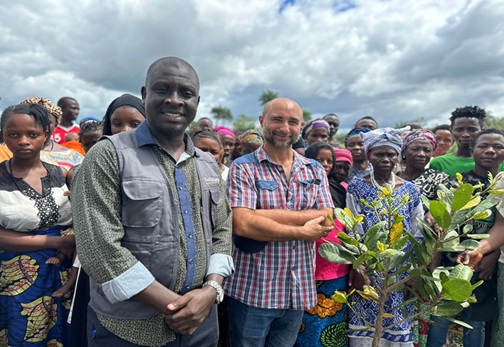To ensure the successful implementation of the Developing Inclusive and Sustainable Cashew Value Chain (DISCA-VC) Programme, funded by the European Union to improve farmers’ livelihoods, strengthen the cashew value chain, and create more jobs for Sierra Leoneans, a team of representatives from the EU Delegation and Solidaridad met and interacted with cashew farmers during a four-day monitoring visit.
The visit, which began in early October, aimed to assess the progress of the programme, which supports 80 cashew farmer groups across 80 communities in Northern Sierra Leone. The team, led by Cappuro Fredrico, EU Policy Officer for Infrastructure and Rural Development, worked alongside Solidaridad and its partners, Develop Salone and Nianda Trading Company, to evaluate the implementation of the programme so far and gather insights for the next phases of its implementation.
As part of the EU Jobs and Growth initiative, the programme is also supporting the Government of Sierra Leone’s efforts to create more employment opportunities and improve the cashew value chain in the country. Speaking after the visit, Cappuro Fredrico highlighted the importance of the mission, noting, “The purpose of our mission, which some people sometimes question, is to report back to our head of cooperation on the results of programmes supported by the EU delegation—to assess whether the implementation phases are progressing well.”
“This is important,” Fredrico continued. “It’s a way to demonstrate that the European Union is spending its funds properly, and we hope this will help secure more funding in the future. Of course, we want the funds to be well spent because they come from European citizens, who expect this, especially in times like these when there’s a lot of scrutiny over how the European Union is spending money.”
Fredrico added that the visit also aimed to identify what is working well in this phase of the project and areas that may need improvement.
“From what I’ve seen so far, the logic behind the intervention is quite positive. With value chains, we sometimes see fragmentation or a lack of coherent connections between the different segments. However, from what I’ve observed, the value chain here is clear, and there is strong engagement with partners, the private sector, and other relevant stakeholders.”
He emphasized that Solidaridad’s intervention is well-structured and that the value chain flow is now better understood.
“I’ve noticed that the communities know Solidaridad and are quite engaged in the work, which suggests that Solidaridad have a strong relationship with them. I understand it’s not easy to reach all these different communities. So, I’ve witnessed this value chain in action and seen positive collaboration between partners.”
Fredrico concluded by stating that the collaboration between Solidaridad, Develop Salone, and Nianda Trading Company is essential for achieving the programme’s goals and that it is a valuable partnership for ensuring success.
Andrew Kojo Morrison, the Country Representative of Solidaridad in Sierra Leone, stated that through the DISCA-VC Programme, Solidaridad, with support from its partners, has worked with 370,000 farmers to plant 120,000 polyclonal cashew seedlings on 3,000 acres across 80 communities in Bombali, Port Loko, Kambia, and Tonkolili.
He added that the four-year project seeks to connect cashew farmers and local processors to markets, creating decent employment opportunities within the cashew value chain. Morrison emphasized the importance of farmers taking ownership of the project’s success and expressed gratitude to Solidaridad and its partners for their collaborative efforts.
“The overarching aim is to ensure income and food security for rural communities, particularly women and young people, while mitigating natural resource degradation and biodiversity loss,” Morrison said.
He also noted that the programme addresses environmental protection to help mitigate the impacts of climate change on farming communities.
The Director of Develop Salone, Allhassan Sesay, highlighted that through the programme, Solidaridad and its partners have provided various capacity-building training sessions on Good Agronomic Practices (GAP), climate-smart agriculture practices, and the development of a vibrant cashew agroforestry system across 80 communities in the four targeted districts.
“We have also selected community members who have been trained to serve as facilitators in their respective communities. These 80 community facilitators have been supporting the training of over 370,000 farmers through a Farmer Field School initiative,” Sesay said.
He noted that the Farmer Field School approach, initiated by Solidaridad and its partners through trained community facilitators, has been successful. He mentioned that farmers are now adhering to standard practices such as proper nursery and spacing of plants, intercropping methods, farm management and maintenance, and fire mitigation strategies.
He added that farmers have received training on tree preservation and other climate-smart approaches.
Musa Suma, Factory Manager of Nianda Agriculture, expressed enthusiasm about working with Solidaridad, its partners, and the EU in the Jobs and Growth Programme.
“The construction of the ongoing cashew factory is a blessing not only for farmers across the country but also for small processors in the factory’s vicinity. It will be a significant boost for the Rogbere community, as it will create many jobs for the local residents,” said Musa Suma.


